2013
13 November 2013
Asia-Pacific Integration Symposium
In partnership with the New Zealand Institute for International Affairs and the Asia: New Zealand Foundation, the Centre for Strategic Studies hosted a one-day conference on the economic and security dimensions of Asia-Pacific integration on 13 November. The conference attracted more than 100 participants and heard papers from a range of New Zealand and international analysts. Overall there was general consensus, if not complete agreement, that the region (however defined) is integrating in the economic and security spheres, that the two are linked but not necessarily correlated with each other, that the processes are different in each arena and that there are both opportunities and potential costs for New Zealand in these regional developments. New Zealand takes an active role in both the security and economic arenas and, most participants argued, should continue to do so.
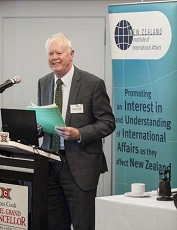
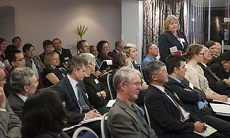
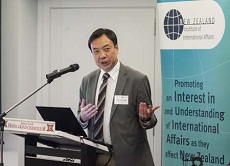
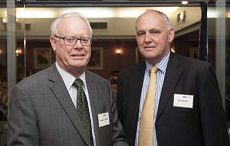

23 September 2013
Sixth Japan/New Zealand Track 1.5 Dialogue
Paul Sinclair, Regional Security Fellow at the Centre for Strategic Studies, participated in the sixth track 1.5 dialogue with Japan held in Wellington on 23 September 2013. The dialogue was jointly organised by the NZIIA and the Asia New Zealand Foundation. He presented a paper: The Korean Peninsular: how much of a problem? (PDF, 417 KB) Other topics discussed during the dialogue included: China's growing influence; the regional economic architecture in the Asia Pacific; US-China relations; and the Middle East with specific reference to events in Syria.
3 October 2013
Expanded ASEAN Maritime Forum
CSS Regional Security Fellow, Paul Sinclair, attended the second Expanded ASEAN Maritime Forum held in Kuala Lumpur on 3 October 2013. This 18 strong forum's membership replicates the membership of the East Asian Summit and the ASEAN Defence Ministers Plus forum. Subjects discussed included Priorities for ASEAN Dialogue Partners in Promoting Maritime Cooperation; Freedom of Navigation and Military Activities in Exclusive Economic Zones, and Future Work for this Forum. Sinclair's attendance was funded by the Ministry of Foreign Affairs' Asian Security Fund.
14th CSS Discussion Paper published - The Drone Debate
Roderic Alley, Senior Fellow at the Centre for Strategic Studies, has published the Centre's 14th Discussion Paper: The Drone Debate: Sudden Bullet or Slow Boomerang? Please contact roderick.alley@vuw.ac.nz for more information.
13th CSS Discussion Paper published - Tensions on the Korean Peninsular
Centre for Strategic Studies' Regional Security Fellow, Paul Sinclair, has released the Centre's 13th Discussion Paper: Tensions on the Korean Peninsular: Implications for New Zealand. Please contact paul.sinclair@vuw.ac.nz for more info
2-4 December 2013
The Ninth CSCAP General Conference
The 9th CSCAP General Conference was held in Beijing 2-4 December 2013 with the general theme of 'Prioritizing Mutual trust and Win-Win Cooperation'. Dr Jim Rolfe, Director of the Centre for Strategic Studies and Paul Sinclair, Regional Security Fellow at the Centre were invited by China CSCAP to be role-players at the Conference. Dr Rolfe moderated the first session which focussed on the topic 'Building a New Type of Major-Country Relations for the Benefit of the Asia-Pacific region' and Paul Sinclair presented a paper in the final session which had as its focus Enhancing a Peaceful and Cooperative Maritime Environment in the Region. A copy of that paper can be found through the link below. Other topics discussed at the Conference included 'Fulfilling the Promise of Regional security Architecture', 'Overcoming Current Obstacles for Peace and Stability in North-east Asia', 'Building a Secure and open Cyberspace through Cooperation', and 'Water Security : Dealing with Common Challenges'. During the Conference there were speeches by HE Mr Liu Zhenmin Vice Minister in China’s Ministry of Foreign Affairs and by Lt Gen Ren Haiquan, Vice President of China’s Academy of Military Science. Immediately prior to the Conference China CSCAP hosted the six monthly meeting of the CSCAP Standing Committee which focussed on plans for activities in 2014. Dr Rolfe and Mr Sinclair also attended that meeting. 12 September 2013
Vietnamese Delegation Discusses South China Sea
On 12 September the Centre for Strategic Studies hosted a roundtable with a Vietnamese delegation led by Major General Vu Chien Thang, General Director of the Foreign Relations Department of Viet Nam’s Ministry of Defence, who was visiting New Zealand to discuss the development of a defence cooperation agreement between New Zealand and Viet Nam. The discussion covered South China Sea developments, outcomes from the second ASEAN Defence Ministers Meeting Plus forum held in Brunei in late August, and bilateral defence relations between New Zealand and Viet Nam.
Read Paul Sinclair's Background Paper on the second ASEAN Defence Ministers Meeting Plus
9 September 2013
CSCAP General Conference Discussions
On 9 September, the Centre for Strategic Studies hosted a visit by the Secretary-General of the China Institute of International Studies [CIIS] and Chair of China CSCAP, Yang Yi, and his delegation to discuss arrangements for the CSCAP General Conference that China will host in Beijing 2-4 December. Other discussion topics included China-United States relations, the Asia/Pacific security architecture, and the possibility of a developing a working relationship between the CSS
27 August 2013
CSS Hosts the First Visit of the Myanmar Institute of Strategic and International Studies
The Centre for Strategic Studies hosted a roundtable on 27 August with a delegation from Myanmar led by Ambassador U Nyunt Maung Shein, Chair of the Myanmar Institute of Strategic and International Studies. It was the Institute’s first visit to New Zealand. Topics discussed included China-Myanmar relations, the future of reform in Myanmar, New Zealand’s defence relations, and New Zealand’s bilateral relations with China and India. It was agreed that the Centre and the Institute should seek to identify opportunities to work together on joint projects, with maritime security being one possibility for joint r
5 August 2013
CSS and Contemporary China Research Centre host Chinese People's Liberation Army
The Centre for Strategic Studies was joined by colleagues from the Contemporary China Research Centre to host a Chinese People’s Liberation Army (PLA) delegation. The delegation was led by Major General Chang Jinxin of the General Staff Department of the PLA and Major General Chen Zhou, Director, Center for National Defense Policy, Academy of Military Science of the PLA. Issues of regional security and China’s approach to the region were the main topics of the discussions.
5 August 2013
Regional Security discussions with Australia's Department of Defence
Australian Department of Defence First Assistant Secretary, International Policy, Neil Orme visited the Centre for Strategic Studies for discussions on regional security issues and the possibilities for cooperation between Australia and New Zealand, especially in relation to the South Pacific.
18 July 2013
Trans-Pacific Partnership and Economic Issues discussed with China's Ministry of Finance
In conjunction with the New Zealand Contemporary China Research Centre, the Centre for Strategic Studies held discussions with a delegation from China’s Asia-Pacific Finance and Development Center, headed by the Deputy Director-General Qiangwu Zhou, on 18 July. The Centre, which is funded by China’s Ministry of Finance, is China’s leading financial and economic think tank and is charged with providing alternative advice to the Chinese Government on economic issues. The discussion focussed on the Trans-Pacific Partnership and possible Chinese participation, and the Regional Comprehensive Economic Partnership
17 July 2013
Indonesian Delegation on South Pacific Engagement visits Centre for Strategic Studies
A delegation from Indonesia’s Centre for the Study and Development of Policy for the Asia Pacific and Africa region held discussions with the Centre for Strategic Studies on 17 July to discuss New Zealand’s engagement with South Pacific countries. The visit is part of a research programme to determine how Indonesia might step up its engagement in the South Pacific, and the delegation was keen to learn from New Zealand’s experiences in the region. The meeting also included a discussion of how ASEAN might develop linkages with the South Pacific region.
21 June 2013
Sustaining the Pivot? Washington's Challenges in the Asia-Pacific
The Centre for Strategic Studies hosted a public lecture on 21 June 2013 by Jeffrey McCausland, Visiting Professor of International Security at Dickinson College in Carlisle, Pennsylvania, on Sustaining the Pivot? Washington’s Challenges in the Asia-Pacific Region. Professor McCausland is also Distinguished Professor of Research and Minerva Chairholder at the Strategic Studies Institute, US Army War College, and serves as a senior fellow at the Stockdale Centre for Ethical Leadership at the United States Naval Academy and the Carnegie Council for Ethics in International Affairs in New York. Professor McCausland assessed the future of United States strategic policy in an environment facing both security and fiscal challenges. The previous day the CSS hosted a roundtable at which Professor McCausland discussed the issues that would arise should Pakistan proceed with the acquisition of tactical nuclear weapons.
You can also listen to Professor McCausland's interview on Morning Report in which he discusses the Edward Snowd
19-20 June 2013
Security and Co-Operation in the Asia-Pacific Region
Dr Jim Rolfe, Director of Programmes, attended the China Institute for International Strategic Studies and Katie Chan Foundation hosted symposium in Beijing, Security and Cooperation in the Asia-Pacific Region, and participated in a panel ‘Cooperation on Asia-Pacific Security: Enhancing Mutual Trust and Cooperative Measures’. The symposium attracted senior scholars and practitioners from around the world. Keynote addresses were given by, amongst others, former Australian Prime Minister, Bob Hawke and Yu Hongjun, Vince Minister of the International Department of the Communist Party of China’s Central Committee, and the programme included a meeting with Yang Jiechi of China’s State Council. Overall, the tenor of the symposium was positive in its assessment of regional security prospects, whilst acknowledging that there are many areas of tension and that states can and should do more to reduce the likelihood that political differences could lead to military confrontation. The Centre intends to remain actively engaged with its Chinese hosts to develop closer understandings of each other’s positions on issues of mutual interest.
12-13 June 2013
Asian Think Tank Summit
The first regional summit of think tanks, jointly hosted by the Think Tanks and Civil Society Programme at the University of Pennsylvania and the Asian Development Bank Institute was held in Tokyo, and attended by the Centre’s Director of Programmes, Dr Jim Rolfe. The purpose of the meeting was to develop relationships between think tanks in different disciplines so that issues common to think tank operations could be identified and lessons learned from each other, and to allow substantive regional issues to be discussed across disciplinary boundaries. The summit was attended by representatives of some 40 regional think tanks and research institutes (as well as several from outside the region) and is intended to be a regular component of the region’s network calendar.
Note: The ‘Think Tanks and Civil Society Programme recently designated CSS as the third most influential think tank in the Asia-Pacific
7-8 June 2013
Centre for Strategic Studies Representative Co-Chairs CSCAP Study Group on Maritime Security
Paul Sinclair, Regional Security Fellow at the Centre for Strategic Studies, co-chaired with Kwa Chong Guan, Senior Fellow from Singapore’s S. Rajaratnam School of International Studies, the CSCAP Study Group on Maritime Security in Singapore 7-8 June 2013. The meeting was attended by 28 participants representing 13 countries. The focus was on the principles for good order at sea, with an emphasis on confidence building measures, information sharing, and the need to enhance regional maritime domain awareness. With maritime tensions high in Asian waters the risk of incidents escalating has increased, underlining the importance of developing appropriate mechanisms to mitigate this risk. The study group began work on a range of recommendations which will now be further developed ahead of the next meeting of this Study Group early in 2014. It is intended that this work will contribute to track one processes such as the ASEAN Regional Forum’s Inter-sessional Meeting on Maritime Security and the ASEAN Defence Ministers Plus Expert Working Group on Maritime S
22 May 2013
After the Missions: Understanding New Zealand's Security Future
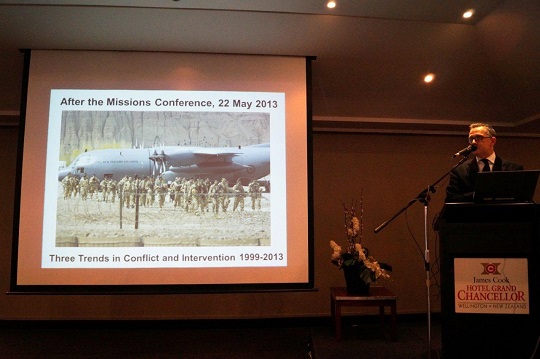
The Centre for Strategic Studies and the New Zealand Institute of International Affairs partnered to run a symposium on 22 May examining the future needs of New Zealand and the New Zealand Defence Force (NZDF) in security terms.
A wide range of papers covered issues around the four themes of: ‘lessons from the last decade of operations’; the views of friends and partners such as Australia, ASEAN countries and the United States; the shape of the future security environment; and what forces might be needed for the near to medium future.
The symposium was opened by Air Vice Marshal Kevin Short, Commander Joint Forces New Zealand, who emphasised the continuing efforts to ensure the NZDF was capable of operating effectively as an integrated and coherent entity. It also featured a presentation from Andrew Davies of the Australian Strategic Policy Institute in Australia, whose reflections on the symposium are reflected in his commentary on the Strategist blog
While there was a healthy debate between paper presenters and in discussion, some general themes were agreed. They included that; the future would require New Zealand to contribute to international peace support operations (and some argued that there would continue to be a need for higher end war fighting capacity); that non-traditional security threats would continue to develop; that future operations would likely involve more than just the NZDF and thus that the NZDF and civil agencies needed to be able to work together more effectively to ensure success in future operations; but that all of this would need to be done without additional resources being made available.
There were many proposals for future activity and these will be examined by the NZDF, other government agencies and the academic community with a view to taking the most relevant to a conclusion.
Papers presented at the symposium will be on the Centre’s website soon.
Commentary from the Symposium:
- Security Council Seat Would Bring Pressures, Vernon Small, The Dominion Post
- Beware Australians Bearing Praise: A Caution for New Zealand, Robert Ayson, The Strategist
- A View from Across the Ditch, Andrew Davies, The Strategist
20 May 2013
Ambassador David Satterfield Roundtable
The Centre for Strategic Studies hosted Ambassador David Satterfield, Director-General of the Sinai Multinational Force and Observers to a well-attended round table on 20 May. Ambassador Satterfield, a distinguished State Department diplomat with wide Middle East experience, discussed the domestic challenges facing Egypt’s President Morsi, the security situation on the Sinai Peninsula, and the daunting issues facing decision makers over what to do in respect of the conflict in Syria.
7 March 2013
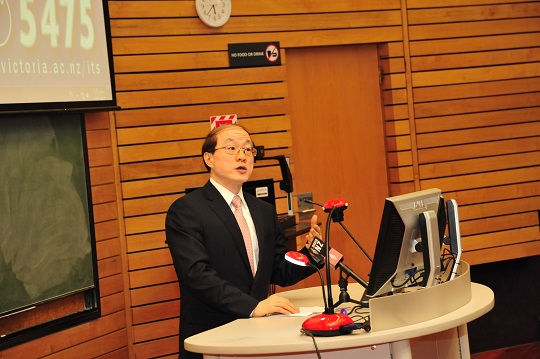
Centre for Strategic Studies hosts address by Vice Minister Liu Jieyi
On the 7th of March the Centre for Strategic Studies, in conjunction with the NZ Contemporary China Research Centre and the New Zealand Institute of International Affairs presented a public address by Liu Jieyi, Vice Minister of the International Department of the Chinese Communist Party’s Central Committee.
The Vice Minister’s well attended address covered domestic and international issues and China-New Zealand relations. The Vice Minister set out China’s domestic agenda including targets for doubling per capita income by 2020 through balanced and sustainable growth; tackling the country’s acute environmental problems; and improving livelihoods.
On the international front Vice Minister Liu signalled a more pro-active approach to working with others to seek the peaceful settlement of disputes, and a determination to find solutions to or ways of managing territorial and maritime issues. And in respect of the bilateral relationship, the Vice Minister said that opportunities abounded for closer cooperation with New Zealand on a range of transnational issues and in promoting regionalp> 5 March 2013
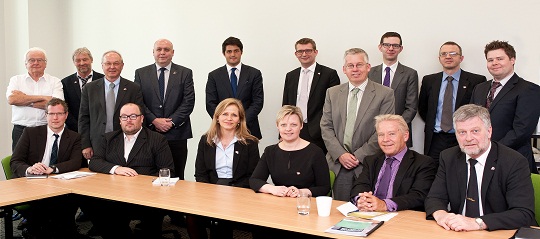
CSS hosts Danish Parliamentary Defence Committee
The Centre for Strategic Studies hosted a round table with Denmark’s Parliamentary Committee on 5 March. The Committee was accompanied by Denmark’s Ambassador resident in Canberra, HE Borge Petersen.
Director Robert Ayson’s opening remarks focussed on some of the major security challenges facing the Asia Pacific region. The discussion that ensued covered China’s emergence as a major power, US rebalancing, and the implications of those developments for regional countries including New Zealand.
The Committee was also keen to learn about the reasons for the deterioration in New Zealand’s defence relationship with the United States in the mid-1980’s and for the much improved relationship over recent years. Other questions centred on cyber-crime, Australia/New Zealand relations and China’s global drive for commodities.
Subsequent feedback indicated that "the Danish Committee found the round table very useful in providing a New Zealand perspective on issues in which Denmark is taking a keen interest", said Rober
24 January 2013
Centre for Strategic Studies ranks third in global ratings
Victoria University’s Centre for Strategic Studies has been ranked third amongst think tanks in Asia by a prestigious global report.
The 2012 Global Go To Think Tank Index Report, produced by the International Relations Program of the University of Pennsylvania, evaluates and ranks more than 5,000 think tanks across the world.
Thousands of international scholars, policymakers, journalists, government officials, donors and think tank executives provide peer and expert review to the indices.
The Centre for Strategic Studies (CSS) was ranked 30th best university affiliated think tank worldwide, and third in a new ‘Asia’ category alongside distinguished research institutes in Australia, Singapore and Indonesia.
Professor Robert Ayson, Director of the CSS, says he is thrilled that experts around the wider world have given the Centre such a high rating.
For the full media release and copy of the report click here
| Document | Full size | File type |
|---|---|---|
| 49.5 KB |
